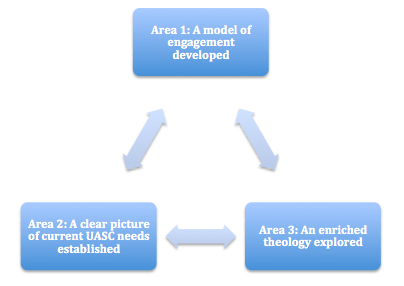Project title: 'Meeting the Needs of Unaccompanied Asylum Seeking Children (UASC) in Gloucestershire: Enhancing the Response of the Local Church'
Project Vision: Gloucestershire Churches: more informed, more engaged, and more resourced to make a difference in the lives of Unaccompanied Asylum Seeking Children
The needs of Unaccompanied Asylum Seeking Children are many and varied. Stakeholders have indicated an urgent need for greater church engagement on behalf of these children. There is a significance need for foster carers in general, and the Church could be instrumental in supporting the local authority’s efforts to mobilise more. Other areas of need the Church could provide for include: support and mentoring in education and life skills, encouraging a sense of belonging and value, and advocacy as they clarify their status and seek to adjust to life in the UK.
The project has been funded by the Diocese of Gloucester Development Fund. It will run from 2016 to 2019 and is being led by Dr Tim Davy, Research Fellow at Redcliffe College. It is one of the activities of Redcliffe's 'Fostering, Adoption and the Church' research project. The UASC project will develop three core areas, reflecting the need to integrate rigorous research with practical and sustainable ways forward in partnership with local churches and other organisations.

Area 1: A model of engagement developed
A coherent, strategic and sustainable model of activities that maximises the impact of local church involvement, informed by and contributing to a national conversation: model developed, presented, and implementation begun. One aim is to mobilise 1000 hours per year of capacity (e.g., tutoring, mentoring, etc) from local church members to support UASC in the Gloucester area.
This model will set out the many opportunities for church engagement, and place them within an overall framework of a holistic church approach. It will take the form of a working document that will explain (1) the need and rationale for church engagement; (2) the opportunities for engagement; and (3) the principles and processes for engagement. We envisage that a core team of stakeholders will be developed to take responsibility for delivering, managing, monitoring and evaluating this aspect.
Area 2: A clear picture of current UASC needs established
A study of the needs of UASC in Gloucestershire, updating a piece of research carried out in 2008 as part of an MA dissertation, which had the title, ‘I Want to be Safe: An Exploration of the Needs of Unaccompanied Young People Seeking Asylum in Gloucestershire’: report written; results and recommendations disseminated to relevant stakeholders.
Area 3: An enriched theology explored
Development of biblical and theological resources that enrich the Church’s understanding and practice of caring for UASC: publication and presenting at an academic level; contributing to a book; dissemination of theological reflection through web and social media; development of resources aimed at churches.
Working with local churches
To root this project in the local Church, we aim to learn from churches already engaged in supporting UASC (and refugees and asylum seekers more generally), and collaborate with them as we develop our outcomes. It will also be that for some churches this will be their first direct involvement with UASC.
Our aim for such relationships is to identify a ‘champion’ at the Church who can act as a link person to work with (even better would be a small team). As an initial ‘Terms of Reference’, this person/team would work with the project to:
- find ways of raising awareness at the Church of the needs of UASC;
- find ways of identifying and mobilising members of the Church to become more engaged in meeting the needs of UASC (for example, offers of mentoring, maths and English tuition, sourcing work experience placements, etc);
- make suggestions and give feedback on proposed new resources to help the above;
- be open to meeting with representatives of other churches and organisations to see what could be done together
In addition we will be working with
GARAS (
www.garas.org.uk) and, at a national level, the charity
Home for Good (
www.homeforgood.org.uk)
If you would like to find out more about the project, or explore how your Church could be involved, please contact Tim directly through the Redcliffe College website:
Contact Tim
Download the free 7 part small group Bible Study written by Tim "More than a Statistic: God’s Heart for Displaced and Vulnerable Children. Click here to download.